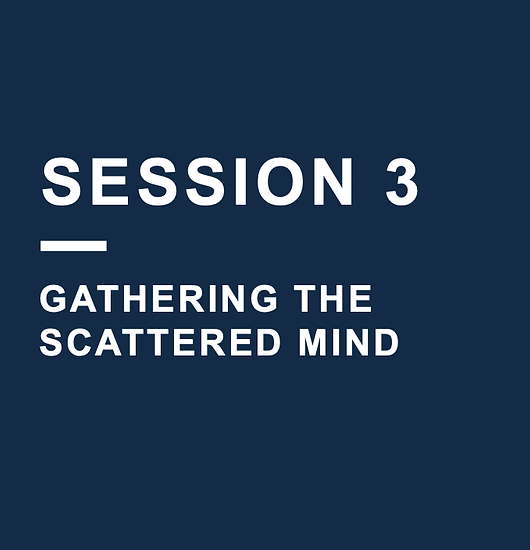Mindfulness For Life (MBCT-L)
Our Mindfulness for Life 8-week course (sometimes also called MBCT-L) blends the ancient wisdom of mindfulness with cognitive-behavioural techniques in ways to help you integrate mindfulness into your daily life. It’s an in-depth, skills-based course created to help you cultivate lasting, sustainable and positive change. It offers approaches to support you with challenges, including recurring patterns of thought and behaviour that can create suffering, and also to help you savour life and flourish.
Sessions are group-based and take place weekly over the 8-week period. The first session is 2.5 hours and the remaining sessions are 2.25 hours. The course also includes a 5-hour ‘Day of Practice’.
"life is the teacher and life is the curriculum."
—Jon Kabat Zinn
-
Explore the importance of staying present by tuning into physical sensations rather than being caught in constant thought
-
Practice using body sensations (e.g., feet, sitting, hands, breathing) as "anchors" to stay grounded in the present moment
-
Reflect on how awareness of the body during speaking and listening can help us remain more present in daily interactions
-
Home practice: Continue with the body scan meditation to cultivate a friendly, non-judgmental awareness of the body


-
Practice focusing on the breath and body to anchor yourself in the present moment and gather a scattered mind
-
Learn and apply the 3-Step Breathing Space to shift from "automatic pilot" to mindful awareness
-
Explore how mindful movement builds on the body scan practice by bringing awareness to body sensations in both movement and stillness
-
Reflect on how mindful awareness can help recognize unhelpful thought patterns and promote self-care through acceptance of limits

-
Definition of mindfulness: cultivating present-moment awareness with curiosity and kindness
-
Understanding the contrast between living on "automatic pilot" and fully experiencing the present
-
The impact of mindfulness on breaking unhelpful habits and reacting less automatically
-
Experiencing mindfulness through exercises for day-to-day activities
-
Explore how we typically react to difficult experiences: tuning out, holding on, or trying to avoid them
-
Explore how we typically react to difficult experiences: tuning out, holding on, or trying to avoid them
-
Use the 3-Step Breathing Space to respond mindfully to challenges rather than reacting impulsively
-
Practice sitting meditation to notice when attention drifts and gently return to the present moment, building the ability to respond skillfully in everyday life


-
Learn to approach difficulties with kindness and care, rather than reacting negatively
-
Practice the "befriending" technique, using phrases like “safe and well” to cultivate goodwill toward ourselves and others
-
Explore how incorporating kindness into the 3-Step Breathing Space transforms how we experience challenges
-
Understand how shifting from avoidance to approach increases openness, creativity, and reduces stress
-
Practice focusing on the breath and body to anchor yourself in the present moment and gather a scattered mind
-
Learn and apply the 3-Step Breathing Space to shift from "automatic pilot" to mindful awareness
-
Explore how mindful movement builds on the body scan practice by bringing awareness to body sensations in both movement and stillness
-
Reflect on how mindful awareness can help recognize unhelpful thought patterns and promote self-care through acceptance of limits


-
Reflect on how you spend your time and whether your choices support your well-being and that of others
-
Identify activities that nourish ("N") or deplete ("D") your energy and mood, and explore how to increase "N" activities and reduce "D" ones
-
Learn to approach both nourishing and depleting activities with mindfulness, being fully present to enhance well-being
-
Establish daily habits of self-care, such as physical exercise, to create a foundation of support for handling stress and difficult times
-
Explore the benefits of awareness and acceptance in responding mindfully rather than reacting impulsively to life's challenges
-
Learn how to skillfully take action when possible, or practice accepting difficult situations that can't be changed with spacious and kind awareness
-
Use the Serenity Prayer as a guide to develop serenity, courage, and wisdom in managing what we can and cannot change
-
Understand the importance of daily mindfulness practice, even brief, to sustain the benefits of mindfulness and build resilience over time

Next Cohort:
June 2025
Fees: Subsidised Fees:
500 SGD 250 SGD
Subsidised fees for:
lower-income, unemployed, disabled, BIPOC individuals
& students
please email me:
support@psychosoma.org
anuj@psychosoma.org
-
What is integrative coaching at PSYCHOSOMA?Integrative coaching at PSYCHOSOMA is a holistic approach to personal development, combining psychological understanding, mindfulness, and body-based techniques. It focuses on the mind-body connection to help clients achieve balance and well-being. Sessions are tailored to each client’s needs, integrating mental and physical health strategies to foster growth and life satisfaction.
-
How is integrative coaching different from psychotherapy?Integrative coaching focuses on personal growth, goal-setting, and improving specific life areas, such as career or relationships, with an emphasis on practical strategies and forward momentum. In contrast, psychotherapy addresses mental health concerns, emotional healing, and deep-rooted issues from the past. While coaching is more action-oriented, psychotherapy dives deeper into understanding and healing emotional or psychological challenges.
-
How is integrative coaching different from traditional life coaching?Integrative coaching differs from traditional life coaching by taking a more holistic approach. It incorporates various techniques and methods from psychology, mindfulness, and wellness practices, aiming to address the mind, body, and emotions. Traditional life coaching typically focuses on achieving specific goals, while integrative coaching works on both personal growth and well-being, considering multiple aspects of a person’s life for a more comprehensive transformation.
-
Is it possible to have in-person sessions?Currently I only offer online sessions, we will let you know if this changes in the future.

